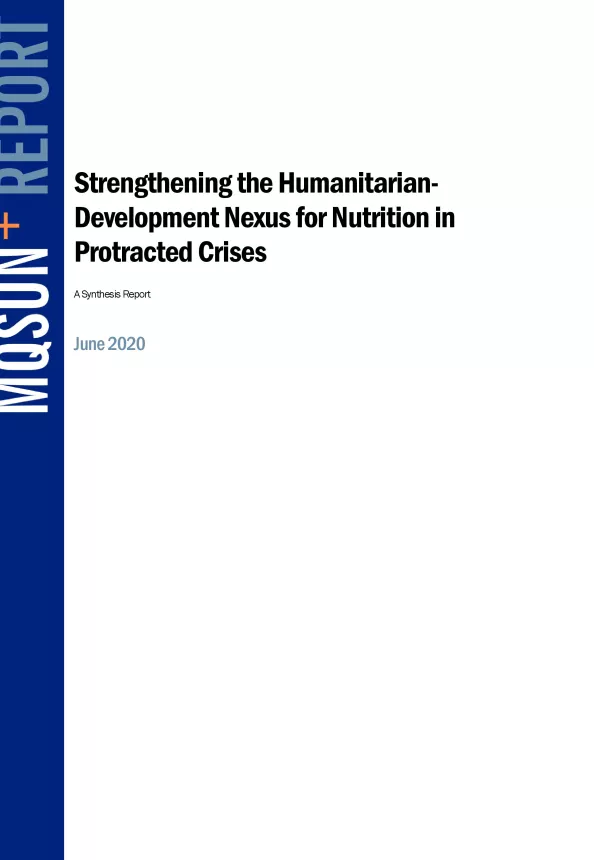Strengthening the Humanitarian Development Nexus for Nutrition in Protracted Crises
Publication details
Introduction and Methods
This synthesis report is based on a desk review on ‘Strengthening the Humanitarian and Development Nexus [HDN] for Nutrition’ and four country case studies from Somalia, Kenya, Ethiopia and Yemen conducted between 2017 and 2019 (MQSUN+ & ENN 2019; ENN 2018, 2017). These studies respond to the recognition that protracted crises (Annex 1) undermine the 2030 Sustainable Development Agenda, as meeting immediate lifesaving needs overwhelm available resources and leave insufficient capacity to address underlying risks and vulnerabilities to malnutrition. The focus is to articulate what wider policy shifts in humanitarian-development action mean for programming and the enabling environment to prevent and reduce undernutrition in protracted crises. Specifically, this report looks at:
- Identifying, sharing and promoting the uptake of examples of good practices in humanitarian and development programming.
- Identifying ways in which the HDN for nutrition can be strengthened to accelerate progress in reducing undernutrition.
This work focuses mainly on preventing and reducing wasting and stunting, rather than the equally important considerations around obesity, overweight and diet-related noncommunicable diseases. Also not included in this analysis are the potential political solutions to protracted crises which may never be achieved whilst the underlying causes, including fragility and conflict, remain unaddressed.
The Kenya and Somalia case studies were carried out in 2017 and 2018, respectively, whilst the desk review was undertaken in early 2019 and helped further frame the approach for the Ethiopia and Yemen studies and for this synthesis report. Each country case study began with a desk review, which was generallyi followed by a two-week country visit from two Emergency Nutrition Network (ENN) technical directors, whoâthrough meetings usually facilitated by the Nutrition Cluster country coordinatorâmet with a range of relevant actors from the government, donor organisations, United Nations (UN) agencies, Scaling Up Nutrition (SUN) Movement network convenors, international and national nongovernmental organisations (NGOs), academia and the private sector. The visits included short periods to observe programme implementation in action. In Somalia, holding large workshops in Mogadishu and Dollow minimised the security risks inherent in multiple interviews and travel; in Kenya and Ethiopia, field visits were arranged in Wajir and Ebinat, respectively.
The intended audience of this report is people involved in the design, implementation, financing and monitoring of multisectoral, multi-stakeholder policies, plans and programmes which aim to reduce undernutrition in protracted crises. It targets participants in national coordination mechanisms relevant to nutrition, including humanitarian clusters, as well as multi-stakeholder platforms (MSPs) for nutrition, such as those promoted by the SUN Movement.
This paper complements other ENN assignments under Maximising the Quality of Scaling Up Nutrition Plus (MQSUN+) and funded by the UK Department for International Development (DFID):
(1) describing the aetiology of wasting and summarising the current evidence on wasting prevention and (2) identifying research priorities for improving how the global community addresses wasting.
i The Yemen case study was conducted remotely due to security constraints; communication challenges were overcome by attending the 2019 SUN Movement Global Gathering to conduct in-person interviews with five government representatives.

